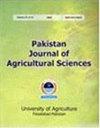微波辅助黑孜然籽提取物的抗氧化性能和挥发性研究
IF 0.6
4区 农林科学
Q3 AGRICULTURE, MULTIDISCIPLINARY
引用次数: 0
摘要
本研究旨在评估微波辅助提取对不同溶剂(乙醇、正己烷和水)提取的黑孜然种子的总酚含量(TPC)、总黄酮含量(TFC)、体外抗氧化特性和主要挥发性成分鉴定的影响。观察到使用不同溶剂的微波辅助黑孜然提取物(MABCEs)的TPC(28.72–37.15 mg GAE/g)和TFC(24.96–32.13 mg QE/g)的变化。同时,通过DPPH、FRAP和β-胡萝卜素漂白分析,体外抗氧化能力分别为63.34%至82.12%、119.82至168.0µM Fe(II)/100mg和30.73%至52.46%。与对照(非微波辅助)相比,微波辅助提取显示出显著更高的TPC、TFC和体外抗氧化特性结果。根据这些体外分析的结果,正己烷提取物被进一步用于气相色谱分析。在鉴定的25种酚类化合物中,对cymene、胸腺肽醌、香芹酚、α-thujene、4-异丙基-9-甲氧基-1-甲基-1-环己烯和长叶烯的含量分别为26.97%、35.91%、2.19%、8.26%、5.45%和4.98%。因此,从抗氧化性能和挥发性特征来看,与传统提取技术相比,微波辅助提取技术更有效。本文章由计算机程序翻译,如有差异,请以英文原文为准。
Investigating the antioxidative properties and volatile profile of microwave assisted black cumin seed extracts
Present study was aimed to assess the effect of microwave assisted extraction on total phenolic contents (TPC), total flavonoid contents (TFC), in-vitro antioxidant characteristics and identification of major volatile components of black cumin seeds extracted using different solvents (ethanol, n-hexane and water). Variation in TPC (28.72 – 37.15 mg GAE/g) and TFC (24.96 – 32.13 mg QE/g) of microwave assisted black cumin extracts (MABCEs) using different solvents was observed. Concurrently, the in-vitro antioxidant capacity varied from 63.34 to 82.12%, 119.82 to 168.0 µM Fe (II)/100mg, and 30.73 to 52.46% as analysed by DPPH, FRAP and β-carotene bleaching assays, respectively. Microwave-assisted extraction showed significantly higher results of TPC, TFC, and in-vitro antioxidant characterization as compared to control (non-microwave assisted). Depending upon the results of these in-vitro analyses, n-hexane extract was further employed to Gas Chromatographic analysis. Among all the 25 phenolic compounds identified, p-cymene, thymoquinone, carvacrol, α- thujene, 4-isopropyl-9-methoxy1methyl-1-cyclohexene and longifolene were reported to be 26.97%, 35.91%, 2.19%, 8.26%, 5.45% and 4.98%, respectively. Therefore, it is concluded that microwave assisted extraction technique is more efficient as compared to conventional extraction techniques keeping in view the antioxidant properties and volatile profiling.
求助全文
通过发布文献求助,成功后即可免费获取论文全文。
去求助
来源期刊

Pakistan Journal of Agricultural Sciences
AGRICULTURE, MULTIDISCIPLINARY-
CiteScore
1.80
自引率
25.00%
发文量
18
审稿时长
6-12 weeks
期刊介绍:
Pakistan Journal of Agricultural Sciences is published in English four times a year. The journal publishes original articles on all aspects of agriculture and allied fields.
 求助内容:
求助内容: 应助结果提醒方式:
应助结果提醒方式:


